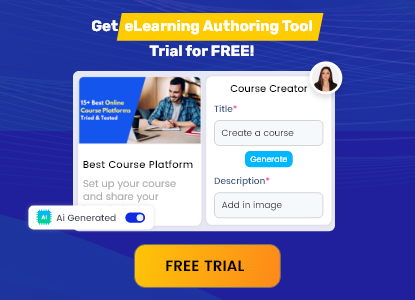In today’s fast-paced digital world, eLearning has become a cornerstone of corporate training, education, and professional development. However, traditional course development can be time-consuming, resource-intensive, and expensive. This is where rapid authoring tools come into play. These tools streamline eLearning content creation, enabling instructional designers, educators, and organizations to develop engaging courses quickly and efficiently.
But what exactly are the advantages of rapid authoring tools, and why are they crucial for modern eLearning strategies? This blog explores their benefits, providing insights into how they enhance learning experiences while saving time and costs.
Why Are Rapid Authoring Tools Essential for eLearning?
With the growing demand for interactive and adaptive learning solutions, organizations need tools that can deliver engaging training modules while keeping costs low. Rapid authoring tool provide the perfect solution by enabling quick content creation, reducing production time, and ensuring seamless integration with Learning Management Systems (LMS).
What Are the Key Advantages of Rapid Authoring Tools?
1. Faster Course Development
One of the most significant advantages of rapid authoring tools is their ability to accelerate the course development process. Traditional methods may take weeks or months, while rapid authoring tools cut development time by up to 50%. Pre-built templates, drag-and-drop functionality, and AI-powered automation allow instructional designers to create courses efficiently.
2. Cost-Effective Solution
Developing eLearning courses from scratch requires hiring programmers, designers, and content creators, increasing costs. Rapid authoring tools eliminate the need for specialized coding expertise, reducing production expenses. Additionally, they allow organizations to reuse assets, further saving money.
3. No Coding Expertise Required
Unlike traditional eLearning development, which often requires extensive coding knowledge, rapid authoring tools provide an intuitive interface that allows users to create interactive content without programming skills. This makes them accessible to subject matter experts (SMEs), educators, and corporate trainers.
4. Multimedia Integration for Engaging Content
Modern learners expect engaging content with videos, animations, quizzes, and interactive simulations. Rapid authoring tools come with built-in multimedia support, making it easy to enhance learner engagement through interactive elements and gamification.
5. Seamless LMS Compatibility
Most rapid authoring tools support SCORM, xAPI, and AICC standards, ensuring easy integration with Learning Management Systems. This allows organizations to track learner progress, analyze performance, and deliver personalized learning experiences efficiently.
6. Responsive and Mobile-Friendly Design
With mobile learning on the rise, rapid authoring tools ensure that eLearning courses are responsive across devices. They provide adaptive design features that adjust content for smartphones, tablets, and desktops, enhancing accessibility for learners on the go.
7. Facilitates Collaboration and Cloud-Based Development
Many rapid authoring tools are cloud-based, allowing multiple team members to work on a project simultaneously. This facilitates seamless collaboration among instructional designers, SMEs, and developers, ensuring faster turnaround times.
8. Easy Updates and Maintenance
Unlike traditional eLearning content that requires extensive modifications, rapid authoring tools enable quick updates. Organizations can easily update outdated content, modify training materials, or adapt courses to meet new industry regulations without rebuilding everything from scratch.
9. Enhances Learner Engagement Through Interactivity
These tools come with built-in features such as drag-and-drop interactions, branching scenarios, and assessments, keeping learners engaged. Interactive learning modules result in better knowledge retention and improved learner performance.
10. AI-Powered Automation for Smart Course Creation
With advancements in AI and automation, many rapid authoring tools now provide AI-generated quizzes, automated voiceovers, and real-time analytics, further optimizing the content creation process.
How Do Rapid Authoring Tools Benefit Businesses and Educators?
For Businesses:
- Accelerates employee training and onboarding
- Reduces costs associated with traditional training methods
- Ensures consistent training delivery across locations
- Enables microlearning for busy professionals
For Educators & Trainers:
- Simplifies lesson creation with templates and multimedia
- Enhances student engagement with interactive content
- Facilitates remote learning and online course delivery
- Allows quick updates based on curriculum changes
Key Takeaways
Rapid authoring tools accelerate eLearning course development, reducing time and costs.
They enable interactive and engaging content creation without programming expertise.
Seamless LMS integration ensures easy tracking and scalability for businesses and educators.
Mobile-responsive designs enhance accessibility for modern learners.
AI-powered automation and cloud-based collaboration further optimize course creation.
Explore Further :- Top 10 rapid eLearning Authoring tools for pro users
Final Thoughts and Call to Action
The advantages of rapid authoring tools make them an essential asset for organizations looking to streamline eLearning development while maintaining high-quality training standards. Whether you’re a corporate trainer, educator, or business owner, these tools provide efficiency, cost-effectiveness, and engagement—all crucial for modern learning strategies.
Looking to enhance your eLearning development process? Explore top rapid authoring tools today and transform your training initiatives with faster, smarter, and more engaging content!
About the author
Pradnya Maske
administrator
Pradnya Maske is a Product Marketing Manager with over 10+ years of experience serving in the eLearning industry. She is based in Florida and is a senior expert associated with Paradiso eLearning. She is passionate about eLearning and, with her expertise, provides valued marketing services in virtual training. Her background includes analyzing, designing, and developing marketing programs to grow and expand online learning programs. She is an expert in building product marketing strategies and working on market trends, competition and pricing. Her true passion lies in solving learning problems and making learning accessible to all.























